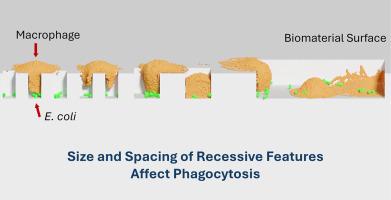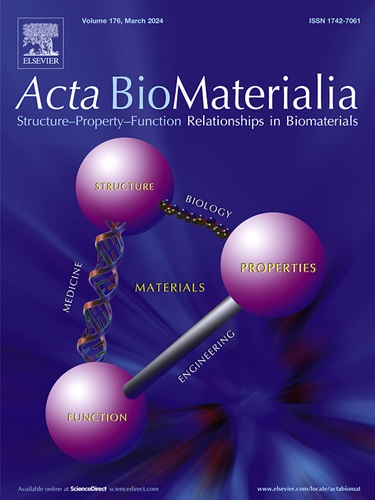Micron-scale topographies affect phagocytosis of bacterial cells on polydimethylsiloxane surfaces
IF 9.4
1区 医学
Q1 ENGINEERING, BIOMEDICAL
引用次数: 0
Abstract
Many medical devices implanted in patients to mitigate diseases and medical conditions have different types of topographic features. While appropriate textures can promote the integration of host cells and reduce scar tissue formation, some textured implants with inappropriate topographies have been associated with inflammation, bacterial colonization, or even malignant complications. To better understand how surface topography affects host immune response to colonizing bacteria, a protocol was developed to investigate phagocytosis of bacterial cells attached on polydimethylsiloxane (PDMS) surfaces with different square-shaped recessive patterns. The interaction between activated RAW 264.7 macrophages and Escherichia coli in recessive wells was visualized in 3D using multiple fluorescent markers. The results revealed that there is a threshold dimension of topography, below which phagocytosis of attached bacterial cells is significantly impeded. Specifically, under our experimental condition, up to 100-fold reduction in phagocytosis was observed in square-shaped patterns with 5 µm side length and 10 µm depth compared to the flat control and patterns with 10 µm or longer side length. The spacing between wells also showed significant effects; e.g., phagocytosis in the wells further decreased when spacing increased to 50 µm. These results are helpful for understanding how undesired topographies may contribute to bacterial colonization and thus infection and other associated complications.
Statement of significance
Surface topography plays an important role in bacteria-material infections and thus the safety of implantable medical devices. Undesired topographic features can cause biofilm formation and related complications. However, how surface topography affects the capability of host immune cells to clear colonizing bacteria is not well understood. In this study, the interaction between macrophage RAW264.7 and colonizing E. coli cells on polydimethylsiloxane (PDMS) with recessive features is investigated. It was discovered that the size of recessive features and the spacing between these features have significant effects on phagocytosis of bacteria by macrophages. These new results are helpful for understanding the complex interaction among host cells, bacteria, and implanted biomaterials, which will help guide the rational design of safer medical devices.

微米级形貌影响聚二甲基硅氧烷表面细菌细胞的吞噬能力
许多植入患者体内以缓解疾病和医疗状况的医疗器械都具有不同类型的形貌特征。虽然适当的纹理可以促进宿主细胞的整合并减少疤痕组织的形成,但一些纹理植入物的不适当地形与炎症、细菌定植甚至恶性并发症有关。为了更好地了解表面形貌如何影响宿主对定植细菌的免疫反应,我们开发了一种方案来研究附着在具有不同方形隐性图案的聚二甲基硅氧烷(PDMS)表面上的细菌细胞的吞噬作用。使用多种荧光标记对隐性孔中活化的 RAW 264.7 巨噬细胞和大肠杆菌之间的相互作用进行了三维可视化。结果表明,地形存在一个阈值维度,低于该维度,附着细菌细胞的吞噬作用就会明显受阻。具体来说,在我们的实验条件下,观察到边长为 5 微米、深度为 10 微米的方形图案与平面对照组和边长为 10 微米或更长的图案相比,吞噬作用降低了 100 倍。孔与孔之间的间距也有显著影响;例如,当间距增加到 50 微米时,孔内的吞噬作用进一步降低。这些结果有助于了解不理想的地形如何导致细菌定植,进而引发感染和其他相关并发症。意义说明:表面形貌在细菌-材料感染以及植入式医疗器械的安全性方面起着重要作用。不理想的地形特征会导致生物膜的形成和相关并发症。然而,人们对表面形貌如何影响宿主免疫细胞清除定植细菌的能力还不甚了解。在这项研究中,研究了巨噬细胞 RAW264.7 与具有隐性特征的聚二甲基硅氧烷(PDMS)上的定植大肠杆菌细胞之间的相互作用。研究发现,隐性特征的大小和这些特征之间的间距对巨噬细胞吞噬细菌有显著影响。这些新成果有助于理解宿主细胞、细菌和植入生物材料之间复杂的相互作用,从而指导合理设计更安全的医疗设备。
本文章由计算机程序翻译,如有差异,请以英文原文为准。
求助全文
约1分钟内获得全文
求助全文
来源期刊

Acta Biomaterialia
工程技术-材料科学:生物材料
CiteScore
16.80
自引率
3.10%
发文量
776
审稿时长
30 days
期刊介绍:
Acta Biomaterialia is a monthly peer-reviewed scientific journal published by Elsevier. The journal was established in January 2005. The editor-in-chief is W.R. Wagner (University of Pittsburgh). The journal covers research in biomaterials science, including the interrelationship of biomaterial structure and function from macroscale to nanoscale. Topical coverage includes biomedical and biocompatible materials.
 求助内容:
求助内容: 应助结果提醒方式:
应助结果提醒方式:


